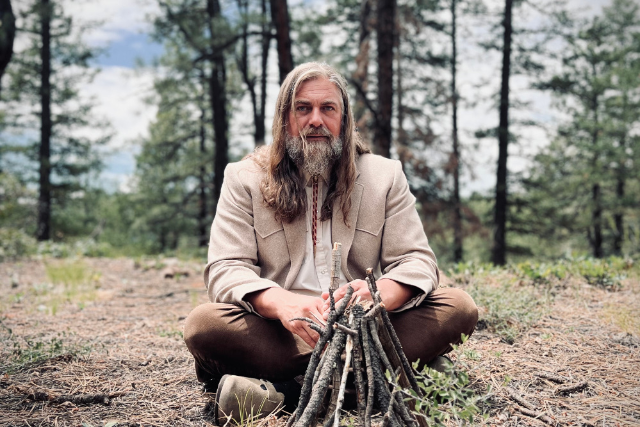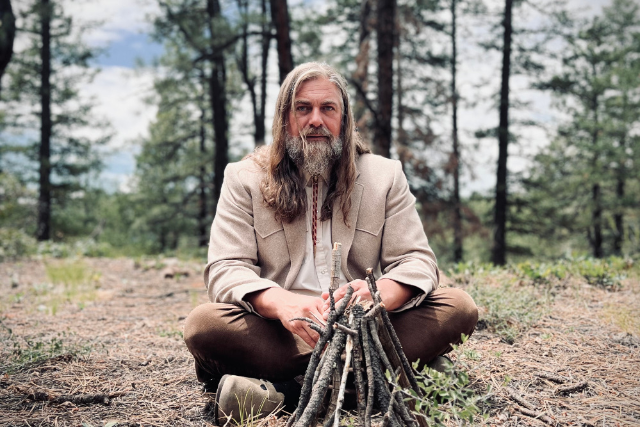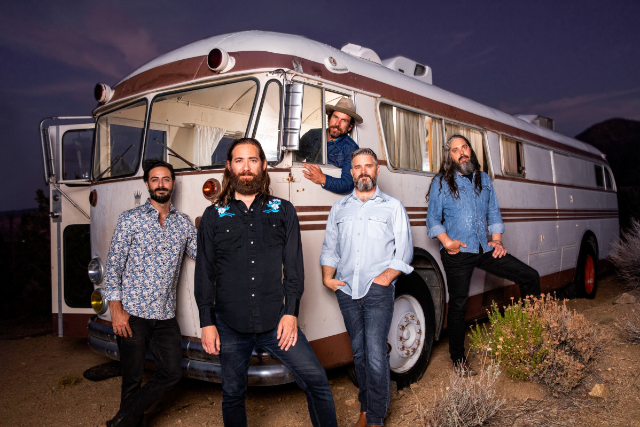Ticket Price: $35 advanced / $35 day of show / $62 reserved loft seating (available over the phone 858-481-8140 or in person at our box office) (seating chart / virtual venue tour)
Not on the e-mail list for venue presales? Sign up to be a Belly Up VIP and you will never miss a chance to grab tickets before they go on sale to the general public again!
There are no refunds or exchanges on tickets once purchased.
All times and supporting acts are subject to change.


THE WHITE BUFFALO
“Everyone knows that you can sing…”
For The White Buffalo – aka singer / songwriter / guitarist Jake Smith, Oregon-born, Southern California-raised – it was time to take the less travelled path; to assemble notions for studio album Number 8, the follow-up to ‘On The Widow’s Walk’ (Snakefarm, 2020), and embark on a voyage of discovery.
Out with the old, the organic, the expected, the tried; in with the new – new producer, new studio, new location, no distractions, no looking back…
Enter ‘Year Of The Dark Horse’…
“You think we’re a country band? A folk band? Americana? Rock? What the fuck are you gonna say now?!” laughs Jake. “With this album, I wanted something outside of what I’ve ever done. I wanted to open up. Do something dangerous. I’m hard to put into a singular genre as it is, but now I really wanted to take away any kind of preconception or pigeon-holing.
“And don’t ask me, cos I don’t know what it is! It’s a genre-bending thing – there’s elements and influences from ELO, Daniel Lanois, Tom Waits, The Boss, circus, pirate music, yacht rock, and I’m driving and pushing some of these numbers in a way I’ve never done before.
“At the top of the pandemic, I put the acoustic guitar on its stand, got a synthesizer and began writing on it, not really knowing how to play keys, just exploring the different sounds and landscapes. In the not knowing, it allowed me to expand my vocal melodies and compositions in ways the guitar had possibly limited.”
When Jake, flanked by regular touring / recording compadres, bassist / keyboard player / guitarist Christopher Hoffee and drummer Matt Lynott, crossed the threshold of East Nashville’s Neon Cross Studio, a converted Southern Baptist Church, he wasn’t chapter an’ verse prepared, as usual.
The time before recording had been a crazy one, so there were a bunch of loose ends to be tied (“I’m a perpetual procrastinator” – Jake), plus only three of the 12 songs had been completely written. Jake had maps in his head, but most were mere bones of compositions with only a few key lyrics penned. This allowed producer / studio owner Jay Joyce – plus trusted assistant, Jason Hall – the wiggle room to really get involved, to guide and explore new frontiers …
“It was a whirlwind of creativity,” recalls Jake. “We tracked 12 songs in 11 days; no over-thinking, no looking for perfection, no egos, no playing it safe, just feel, and I’ve never had a producer act so much like a producer… twisting, elevating and contorting our talents!”
With an impressive clientele numbering Eric Church, Brothers Osborne, Fidlar, Ashley McBryde, Halestorm, Little Big Town, Cage The Elephant, to name just a few, multi-instrumentalist Joyce has a reputation for working at an intense level.
He’s a Grammy Award-winning Producer of the Year (2018), has 4 CMA and 5 ACM Awards, and when it comes to making music, the Ohio native is never one to take the obvious route – perfect for an album featuring a dozen musical vignettes, individual yet constant in flow; an album loosely based around the shifting of the seasons and the shifting of a relationship; an album showing off the complete scope of Jake’s song-writing craft, from the stripped back to the fully loaded…
“Jake is fierce, he basically wrote a whole movie,” says Jay. “We holed up in an old church, in the midst of the pandemic. It was just the four of us, making the soundtrack to his movie, and I have to say, it was inspirational.”
To keep the storyline as clear as possible, the 12 songs were recorded in sequence, with every square inch of Neon Cross brought into play; a new sonic palette was required, a unique set of sounds, and if it meant pushing the musicians into new, sometimes uncomfortable, areas, well, that was the price to pay…
“Oh, he would break at least one of us on the daily!” exclaims Jake. “At some point, we all questioned if we could even sing or play! We’d start at 11, have lunch at one or two, be done by seven, and we felt like we’d gone to war!! Exhausted, our heads spinning. Like, what did we even do today?!
“A lot of stuff was tracked on the fly, and Jay would help guide arrangements, bridges, links, all sorts of things, then he ended up adding other elements in the mix to bind it all together. He’s an insane musician and he would change things on a dime. We’d spend an hour getting a drum tone, then he’d say, ‘Sounds amazing, but any fool can make a drum kit sound good’. So he’d abandon all of that, and end up using a 50 dollar child’s kit mic’d with a singular microphone and pump it through a tiny Marshall amp. His mind works in a manner I’ve never witnessed in anyone else!”
But what about the vocal recording? Surely Jake’s signature baritone, a much-revered calling card, required nothing more elaborate than a candle-lit corner, some honey, cigarettes and coffee…
“Not reallyl!” laughs Jake, “he kept putting me in strange and awkward positions – on two or three of the songs, he sat me down on a low-profile couch, with the mic a foot off the ground, so I’m hunched over singing with my knees higher than my head. He was taking away my body, my power. He’d say, ‘Everyone knows that you can sing, bro, what else is there…?’ He was looking for a vibe, a cool factor, not vocal acrobatics.
“And he’s meticulous about trimming the fat, and about syncopation, where the words are landing. He would also sense if something wasn’t quite working, or if it was getting repetitive; on ‘Love Will Never Come’ he forced me to abandon the vocal melody and lyrics I had prepared, nearing a hundred words, saying it sounded like, ‘Hickory Dickory Dock… I’m bored after hearing that melody twice’. He made me take an entirely different approach, on the spot, like, ‘Make up something cool. Now! GO! GO!’ I’ve never been challenged like that before! The first thing that spilled out of me was the map for that performance.
“He’s a fucking genius with a splash of bullying ex-wife. You know he’s right, you trust him, and he will push you beyond what you think you’re capable of.”
For ‘Year Of The Dark Horse’ to achieve its full potential, Jake knew the experience had to be immersive, which is why the Nashville location proved crucial. Not only were the three musicians away from the lures of home, but the house they all stayed in was just a block from the studio, and filled with a variety of instruments. Wherever they were, they could hone in on the project, and some of the songs came together while the clock was ticking…
“I wrote ‘Love Song #3’ eight days into recording,” remembers Jake. “I knew the story and the scope of the album needed a true love song, so I wrote one from a melody I had swimming around in my head.
“I work strangely well under desperate conditions,” he continues, making sure to give credit to his fellow musicians, his ‘band of brothers’; they hadn’t heard the songs at all prior to entering the studio, “coming in blind”, but they collectively stepped up to the plate, and beyond, sometimes getting a tune out of instruments they’d never even heard of!
As for Jake, he was happy to embrace a project where new boxes were being ticked on a daily, sometimes hourly, basis. This time around, it was all about building on glories past, adding fresh, exciting, more left-field moments to a style and a sound that has seen his music growing in stature worldwide, supported by key placements in the worlds of TV and film (‘Sons Of Anarchy’, ‘Californication’, ‘The Punisher’, ‘The Terminal List’, etc.).
Over the years, Jake has built a second-to-none reputation for the emotional weight of his music, and here this core element dramatically underpins a body of work that allows the imagination of the listener to play an important part throughout, building on a tale of debauchery (of the drunken variety) and blame, of love and loss, a life lived against the odds, the whole thing set in one lunar year, following our anti-hero through the highs and lows of the seasons.
And who is this mysterious Donna? And what was she doing in the bar? And in the bathroom?! (‘She Don’t Know That I Lie’). She’s right there at the heart of the action, and the song that bears her name is probably the most propulsive on the album – an open display of Jake’s deep regard for the great Jeff Lynne…
“During the pademic, I would ride around on my bike with a speaker on the back, tripping balls, and listening to ELO,” he recollects. “I love Jeff Lynne!”
Hard on the stiletto’d heels of ‘Donna’ comes album closer ‘Life Goes On’, which bring things to a conclusion in gentle, reflective tones. Jake felt his way through the song in the studio, then when he stepped up to do it for real, was told by Joyce that his first take was ‘the one’…
“He wouldn’t let me have another crack! ‘You can’t beat that!’ One single imperfect take when I wasn’t even aware we were recording. Pure, honest, true...”
Which effectively sums up ‘YOTDH’ as a whole, The White Buffalo’s most unpredictable and inventive work to date, the most well-rounded, too – surprising, spontaneous and spectacularly genre resistant.
‘Year Of The Dark Horse’, coming soon via Snakefarm: normal rules do not apply.
Full track-listing:-
-
Not Today
-
Winter Act 2
-
Kingdom For A Fool
-
Love Will Never Come/Spring’s Song
-
She Don’t Know That I Lie
-
C’mon Come Up Come Out
-
Love Song #3
-
Heart Attack
-
Am I Still A Child
-
52 Card Pickup
-
Donna
-
Life Goes On

Rose's Pawn Shop, Punch-Drunk Life
With their fusion of bluegrass instrumentation and folk-rock amplification, Rose's Pawn Shop have spent the better part of two decades carving out an Americana sound that's as diverse as the band's native Los Angeles. Their past releases offer a melting pot of modern-day roots music, shot through with electric guitar, fiddle, raw percussive stomp, and stacked vocal harmonies. Anchored by the sharp songwriting of frontman Paul Givant, it's a sound for campfires and car stereos, for front porches and dive bars, for the heart as well as the heartland.
With Punch-Drunk Life, Rose's Pawn Shop makes a long-awaited return after an eight-year absence from the recording studio. Things have evolved since the group's previous album, Gravity Well, earned high marks from Rolling Stone (who dubbed the record "a blast of 21st century pickin'-party music") and GQ (who praised the group's "knee-slapping bluegrass-y twang"). Bandmates have come and gone. Families have been built. Side projects have been launched. Meanwhile, Rose's Pawn Shop have continued to expand both their artistry and their audience, thanks to a dedicated touring schedule that's taken the band from the venues of Southern California to the fishing villages of Alaska to the mountain towns of the American Southwest.
"We've always resonated with people who live in remote communities and far-flung locations," says Paul. "We spend a lot of our time playing mountain towns like Madrid, New Mexico, connecting to the people who, like us, are out there searching for something."
That search continues with Punch-Drunk Life. Recorded amidst the chaos of the Covid-19 pandemic, it's a life-embracing album rooted in the lessons learned during times of struggle. "Old Time Pugilist," the record's dynamic opener, turns a boxing metaphor into a bold battle cry about fighting against life's hurdles and hardships. "The Lonely One" finds Givant rededicating himself to the hardscrabble life of a road warrior. "Gratitude" celebrates the legacy of a departed loved one, while songs like "Ghost Town," "High Lonesome," and "Halfway Down the Road" coat themselves with the cinematic, sepia-filtered imagery of the band's tours across North America's forgotten places. Recorded by a band of genuine road warriors, Punch-Drunk Life swirls together its own geography: a place where endless highways, desert landscapes, and the long road toward home all converge.
Featuring contributions from guitarist/producer Zachary Ross, upright bassist Stephen Andrews, drummer Matt Lesser, and multi-instrumentalists Tim Weed and John Kraus, Punch-Drunk Life presents a new and improved Rose's Pawn Shop. The songs are sharper, their melodies flanked by bursts of banjo and mandolin. The lyrics are storybook-ready. At the center of that evolution is Paul Givant, whose songs bear the signs of an articulate, well-read wordsmith who enjoys exploring not only his external world, but also his internal workings. "My writing has become more precise," he says. "I've learned how to say more with less, and I'm embracing more pop sensibilities. Our earlier albums had a darker tint, but this one is more hopeful. It's a reflection of the positive things in my life — my marriage, my relationships with friends and family — against a backdrop of the challenges we're still up against."
Rose's Pawn Shop have a long history of rolling with the punches. Resilience is built into the band's DNA, influencing everything from their name — a nod to Givant's ex-girlfriend, Rose, who infamously reacted to the pair's breakup by stealing the band's equipment and pawning it across Los Angeles — to their commitment to finding a path forward in the face of of shifting lineups, growing responsibilities at home, and a global pandemic that brought their touring schedule to a standstill. Accordingly, the guys began recording Punch-Drunk Life during the thick of the pandemic, with each bandmate recording his parts remotely. As quarantine restrictions began to lift, they headed to Electro Sound Studios in the Hollywood Hills. The musicians took their time, capturing the fiery spirit of the band's live performances without losing sight of their frontman's measured melodies. The result is the band's most vivid and vital work to date, with performances that match the poignant punch of Givant's songwriting.
"Paul is always writing," Andrews adds. "He never stops. Songs like 'Ghost Town' aren't just songs to me; they're a time and a place, too. He's writing about the things we've done and the towns we've seen."
An album about self-improvement, forward momentum, and hard-won optimism, Punch-Drunk Life might as well be the soundtrack to a world still regaining its footing after a series of crushing missteps. This is anthemic roots music, stocked with introspective songs that deliver universal messages of courage and conviction. Rose's Pawn Shop may be punch drunk — it's hard to avoid a few bruises while navigating the twists and turns of the ever-changing music industry, after all — but they've learned to hit back, too. They've toughened up, and with Punch-Drunk Life, they've delivered a knockout blow.
Paul Givant – Lead Vocals, Guitar & Banjo
Zachary Ross – Electric Guitar & Vocals
Tim Weed – Fiddle & Vocals
Stephen Andrews – Upright Bass & Electric Bass
Matt Lesser – Drums & Vocals
Ticket Price: $35 advanced / $35 day of show / $62 reserved loft seating (available over the phone 858-481-8140 or in person at our box office) (seating chart / virtual venue tour)
Not on the e-mail list for venue presales? Sign up to be a Belly Up VIP and you will never miss a chance to grab tickets before they go on sale to the general public again!
There are no refunds or exchanges on tickets once purchased.
All times and supporting acts are subject to change.




